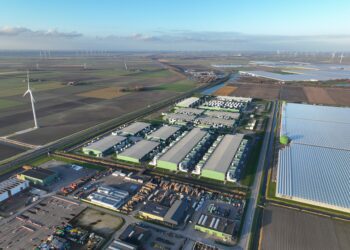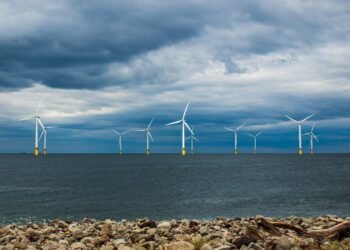- The Intergovernmental Panel on Climate Change (IPPC) will publish a new report on Monday Aug. 9.
- The report is expected to show temperatures rising more quickly than expected and show the long-term effects of increased CO2 in the air.
- Public and private actors must act now to get to net zero.
The first part of the Sixth Assessment Report of the Intergovernmental Panel on Climate Change (IPPC) will be published on Monday Aug. 9. This report will detail how anthropogenic greenhouse gases are causing unprecedented damage.
The IPCC, which consists of 195 governments, has emerged as one of the most credible sources of climate science. IPCC members aggregate and agree to the best climate science available globally before publishing. The new IPCC report will contain several key findings to look out for.
Temperatures are rising more quickly than we thought
Baseline temperature refers to the predicted increase in average global temperature rises. Earlier in the year, the UK Met Office and World Meteorological Organization released research demonstrating that there is more than a 40% chance that the annual average global temperature in at least one of the next five years will temporarily reach 1.5C above pre-industrial levels.
Through the Paris Agreement in 2015, the international community agreed to keep global temperature rise this century well below 2.0°C degrees above pre-industrial levels, and to pursue efforts to limit temperature increase to 1.5°C. The 1.5°C threshold is important because beyond this, so-called “tipping points” – positive feedback loops where global warming causes a permanent shift in earth systems, locking in further warming – become more likely.
The IPCC report is expected to bring forward when scientists expect to reach 1.5C to the mid-2030s, at which point tipping points such as lose of artic sea ice, larger-scale die-offs of coral reefs, and thawing of the methane-rich permafrost become much more likely.
Increased CO2 will have dire long-term effects
Another core concept in the IPCC report is expected to be the long-term effect of increased CO2 in the air. The Earth takes time to adjust to increases of CO2 in the air, and the Equilibrium Climate Sensitivity (ECS) estimates how much the earth will warm with a doubling of the amount of CO2 in the air. This is important because CO2 has increased from its pre-industrial level of around 280 parts per million (ppm) to an estimated 415 ppm today, with a predicted doubling of CO2 in the air around 2060.
Recent research predicts the increase in global average temperature with a doubling of CO2 in the air to between 2.6-4.5C. The difference between 1.5C short term, and between 2.6C and 4.5C longer term may seem small at first glance. However, the difference between 1.5C, 2C, and 3C is the difference between average droughts lasting two, four or 10 months per year, and the difference between 6%, 18% or 68% (for an increase to 4.5C) means invertebrates globally losing of their habitat. These longer-term trends are in addition to the extreme weather we have witnessed across Europe and the US over the past two months.
There’s still time to act
The IPCC report will likely warn that we are dangerously close to breaching Paris Goals of limiting average global temperature rise to 1.5C, but that 1.5C is still within reach. G7 Leaders re-affirmed their commitment to 1.5C in Carbis Bay, UK, in May. After G20 Environment Ministers failed to agree on wording around the Paris Goals, a similar signal is on the table for the G20 Leaders meeting in October.
The science tells us that to limit the worst consequences of climate change, we must aim for net zero as soon as possible, and by 2050 at the very latest, and that we need rapid short-term decarbonization efforts this decade.
Moreover, there is an increasing moral and economic imperative to respond to the consequences of climate change we are already witnessing. The poorest communities are often those that contribute the least to climate change but are most vulnerable to its consequences. Through the UN Framework Convention on Climate Change’s (UNFCCC) Conference of Parties (COP) process, these countries are able to leverage their equal status to their richer counterparts as UNFCCC parties to highlight the importance of climate adaptation and resilience.
The overarching goal of COP26 President Alok Sharma is for the international community to come forward in Glasgow in November with long-term emission reductions targets, complemented by immediate short-term action to ‘keep 1.5 alive’. As we have learned from the COVID-19 pandemic, prevention is better, and far less costly, than cure.
The COP26 Summit will be unprecedented in bringing business leaders into the global effort on climate change, and public-private collaboration will be key to achieving these dual goals of mitigating carbon emissions to keep 1.5C alive, and supporting all communities to adapt to, and be resilient to, climate change.
The World Economic Forum’s Climate Action Platform aims to support the ambitious climate action required to achieve the goals of the Paris Agreement, while protecting our planet, driving sustainable prosperity and ensuring the economy works for all people. The platform aims to achieve this through accelerating the net-zero transformation of global sectors such as energy, transport and industry, by helping to unlock the finance necessary to fund the transition, and by supporting policymakers to take more ambitious climate action.
By Nathan Cooper
About the author: Nathan Cooper is Lead, Partnerships and Engagement Strategy, Climate Action Platform, World Economic Forum.
This article originally appeared at https://www.weforum.org/agenda/2021/08/ipcc-report-on-climate-change/ and is republished with permission.












